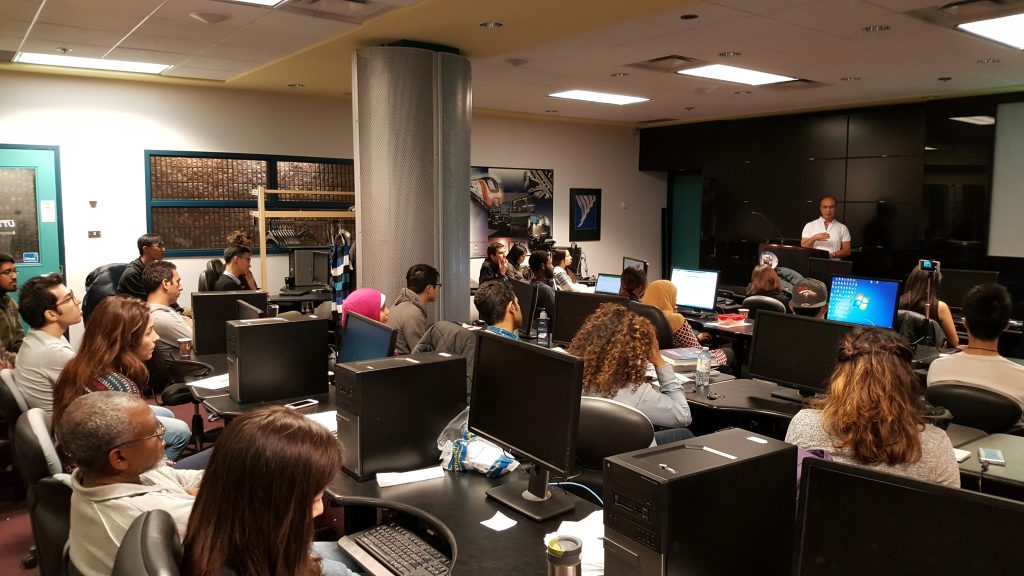
Currently, the private sector is the main driver of advances in transportation technology—but do private sector intentions align with social needs?
At his November 3 UT-ITE seminar, Professor Baher Abdulhai discussed the motivations, goals and methods behind the July 2017 launch of the iCity Centre for Automated and Transformative Transportation Systems (iCity-CATTS). Created to address the uncertainty surrounding the impact of new and emerging transportation technologies, such as automated and electric vehicles, iCity-CATTS will pursue a proactive approach to planning for the best possible outcomes.
The three main goals of iCity-CATTS are to:
- Quantify transformation;
- Enable positive transformation; and
- Ensure the sustainability of cities under transformation.
The ultimate aim of iCity-CATTS is to gather data to generate demand, travel and network models, and produce a reusable, virtual city analysis platform.
Abstract
Impact of automated and transformative transportation systems: Aspirations, questions and most importantly, a plan
The boldest vision for smart transportation in our cities of the future is autonomous, green, pervasively connected and shared.
Numerous technological advances are rapidly emerging and transforming how we travel. The key emerging disruptive technologies and services include driving automation, pervasive connectivity, green powertrains, mobility sharing, innovative first-mile-last-mile services to access transit, and innovative robotic delivery of goods.
At the same time as technology is rapidly advancing, there are equally transformative attitudinal changes and emerging needs on the travellers’ side. Millennials and younger travellers, for instance, are more likely to be familiar with technology, more open to sharing, and less keen on private auto ownership. Meanwhile, the mobility needs of the very young as well as aging populations can tremendously benefit from transformative technology solutions.
Those technological and attitudinal changes, together with innovative provisioning of Mobility-as-a-Service (MaaS), are, therefore, rapidly transforming cities.
Contradictory predictions abound, ranging from a decrease in the need for cars to only 10% of the number we have today, and car ownership becoming a thing of the past, all the way to zero-occupant (“zombie”) vehicles contributing to gridlock. Although numerous studies and technology testbeds are underway globally, they do not address the large scale of cities and metropolises. There is an urgent need in large cities for a structured interdisciplinary research to address the city scale effects.
This talk will shed light on the intended and unintended consequence and risks of automated and transformative transportation in our smart cities of the future. The focus is not on technology per se but on large and complex transportation system of systems in cities. The speaker will share ongoing work, plan and vision at the iCity Centre for Automated and Transformative Transportation Systems (iCity-CATTS) on how to exploit disruptive transportation technologies and services to maximize the benefits to cities in terms of enhancing systems performance, reliability, safety and sustainability, while avoiding potential risks and pitfalls.
iCity-CATTS is an ambitious effort that brings academic researchers together with municipal, provincial and federal governments, and the private sector to create analytical tools and decision support systems, along three themes: (1) quantify the impacts of transformative technologies on transportation system demands, infrastructure capacities and system performance, (2) guide the inevitable transformation in socially positive directions, and (3) respect, protect and improve the economic, social and environmental sustainability of our future cities.

Baher Abdulhai has 29 years of experience in transportation systems engineering and Intelligent Transportation Systems (ITS). He has been a professor at the University of Toronto since 1998. He is the Director of the Toronto ITS Centre, the new i-City Centre for Automated and Transformative Transportation Systems (iCity-CATTS), and the co-founder of the ONE-ITS research society.
Abdulhai received several awards including IEEE Outstanding Service Award, Teaching Excellence award, and research awards from Canada Foundation for Innovation, Ontario Research Fund, and Ontario Innovation Trust. He served on the Board of Directors of the Government of Ontario (GO) Transit Authority from 2004 to 2006. He served as a Canada Research Chair (CRC) in ITS from 2005 to 2010.
The ITS Centre won the Ontario Showcase Merit Award of Excellence and the National GTEC Bronze Medal Award in 2005. His research team won international awards including the International Transportation Forum innovation award in 2010 (Hossam Abdelgawad), IEEE ITS 2013 (Samah El-Tantawy) and INFORMS 2013 (Samah El-Tantawy). In 2014, he won the University of Toronto Inventor of the Year Award. In 2015 he has been inducted as a Fellow of the Engineering Institute of Canada (EIC).
Areas of Expertise: Intelligent Transportation Systems (ITS), modelling and simulation of large scale dynamic transportation networks, Artificial Intelligence (AI) based street and freeway traffic control, traveller information systems, emergency evacuation optimization, dynamic road pricing, pervasive and mobile ITS, open transportation services innovation and network enabled ITS, Intelligent Transportation System of Systems (ITSoS).
This seminar was presented by the University of Toronto Institute of Transportation Engineers (ITE) Student Chapter.
